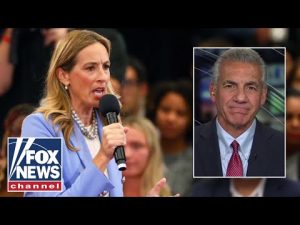**FBI’s Handling of Investigations Under Fire: A Showdown of Accountability**
In a fiery exchange that had more heat than a summer barbecue, Senator Ted Cruz put former FBI Director James Comey in the hot seat during a recent congressional hearing. The topic on everyone’s lips? The FBI’s handling of investigations tied to alleged Russian interference and the infamous “Steele Dossier.” Senator Cruz, armed with a report from the Inspector General, decided it was time to dig deep and get to the bottom of how the Bureau conducted itself in one of the most scrutinized political investigations in modern history.
Cruz opened the floodgates with pointed questions, asking Comey if he believed the FBI’s actions during the Russia investigation were “competent and honest.” To that, Comey gave a nod of affirmation, much to Cruz’s dismay. It was almost as if Comey had thrown a lit match into a pool of gasoline. Despite the horror show that many believe the Carter Page FISA application represented—filled with 17 significant errors—Comey insisted that the investigation was primarily conducted with integrity. This brought out an incredulous response from Cruz, who didn’t shy away from pointing out the glaring discrepancies.
The dust started to really kick up when Cruz zeroed in on the actions of a former FBI attorney, who, according to the Inspector General’s findings, allegedly altered a critical email. This email misrepresented the CIA’s assessment of Carter Page, turning “source” into “not a source.” Cruz challenged Comey, asking if it was standard practice for the FBI to inject such deceit into federal court submissions. Comey steadfastly denied any such practices, but the tension in the room thickened like gravy on Thanksgiving.
Senator Cruz then pivoted to the dark and tangled web of the Steele Dossier, which has been called everything from political opposition research to complete nonsense by various critics. Cruz pressed Comey on when he first became aware that the document was funded by the Democratic National Committee. Comey claimed he learned of it in September 2016, but the senator was quick to press further, questioning why this critical detail was omitted from FISA court filings. The implications of hiding information from the court were not lost on Cruz, who emphasized how vital it was for justice that the court has access to all pertinent facts—especially those that could change the outcome of an investigation.
As the hearing continued, Cruz did not relent, steering the conversation toward the credibility—or lack thereof—of the sources behind the Steele Dossier. He pointed out that the primary subsource for the dossier was a suspected Russian agent, raising eyebrows and alarm bells alike. Cruz’s concern was echoed by many who watch these proceedings closely. How could the FBI not conduct due diligence on a source with such a checkered past? Comey’s response indicated a lack of awareness, causing Cruz to ponder how the Bureau could justify their actions when they seemingly relied on questionable information.
Cruz’s closing remarks hit home for many watching. He made it clear that the inquiry into the president was marred by corruption, asserting that the FBI had become a political weapon, tarnishing the reputations of honest agents working for justice. The debate left Americans pondering: were these failures a product of incompetence, or was there something more nefarious at play? For those invested in the integrity of law enforcement, the implications are vast, and the fallout from this hearing may echo well beyond the Senate chamber.
The showdown between Cruz and Comey not only highlighted the conflicts within one of America’s most respected institutions but served as a reminder that accountability is necessary to restore public trust. As discussions continue, one thing is for certain: the quest for answers is far from over.







